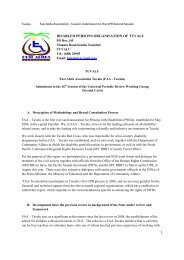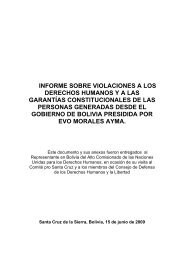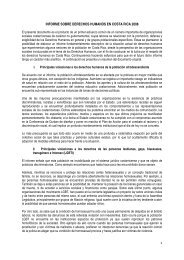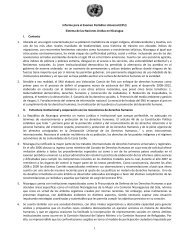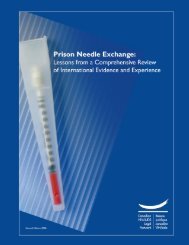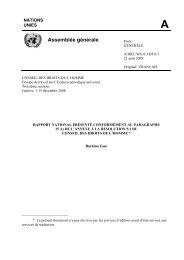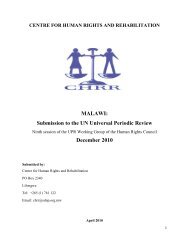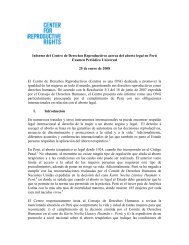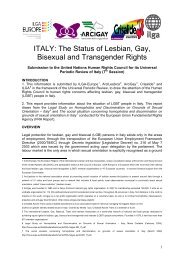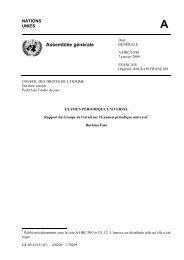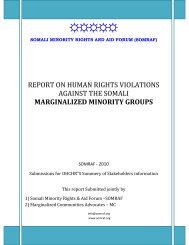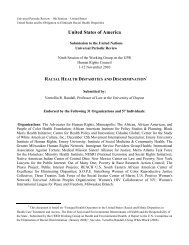JOINT STAKEHOLDERS REPORT ON - Universal Periodic Review
JOINT STAKEHOLDERS REPORT ON - Universal Periodic Review
JOINT STAKEHOLDERS REPORT ON - Universal Periodic Review
Create successful ePaper yourself
Turn your PDF publications into a flip-book with our unique Google optimized e-Paper software.
I. Methodology and Consultations<br />
1. The present Dalit Stakeholders Report has been prepared following a national level<br />
consultation with more than 100 local, state-level and national Dalit movements,<br />
organizations and platforms, and other like-minded NGOs organized by National<br />
Coalition for Strengthening PoA Act an initiation of National Campaign on Dalit Human<br />
Rights (NCDHR) through one of its movement National Dalit Movement for Justice<br />
(NDMJ). At the time of submission, this report has been endorsed by 563 organizations<br />
(see Annexure II for the list).<br />
2. This report is a compilation of primary and secondary sources collected from various<br />
organizations, experts working on Caste Based Discrimination and Violence.<br />
Information was also obtained from different credible sources including the UN Treaty<br />
Bodies, UN Special Procedures, and Government Reports etc. This report reviews the<br />
implementation of recommendations given to India during the first cycle of UPR, Treaty<br />
Bodies and Special Procedures and based on evidences of the violation of the rights of<br />
Scheduled Caste/Dalit men, women and children who are the victims of caste based<br />
discrimination and violence.<br />
II. Follow-up of the accepted recommendations of UPR I<br />
3. Many CSOs (Civil Society Organizations) working on the rights of Scheduled Castes<br />
(SCs) were actively involved in assessing the follow up of the accepted<br />
recommendations by the Government of India (GoI). This follow up still remains<br />
unfinished except for extending standing invitations to all Special Procedures. The<br />
present report would like to emphasize the following:<br />
Recommendation No.1 Ratification of the Convention against Torture:<br />
4. Currently, the Prevention of Torture Bill 2010 in its amended version has yet to be tabled<br />
before both Houses of Parliament. In 2008, a series of People‘s Tribunals on Torture<br />
covering 47 districts across 9 states, clearly revealed that more than 60% of the victims<br />
of torture either belonged to Scheduled Castes or were religious minorities The adoption<br />
of the Bill (2010) should be given immediate priority, even prior to ratification at UN<br />
level.<br />
Recommendation No.5: Disaggregated data on caste and related discrimination<br />
5. Firstly, despite early strong resistance from GoI, the 2011 nationwide census of castewise<br />
enumeration has been done. But there are serious lacunae: (i) disaggregation of data<br />
by caste, gender, religion, status and region is missing; (ii) no data available on<br />
education, health, civic amenities, employment, entrepreneurship, and other important<br />
social indicators. Secondly, the National Crime Record Bureau Report of GoI does not<br />
provide disaggregated data on crimes against SC and ST women and children, so<br />
essential for proper policy intervention. Besides, there is neither proper analysis, nor<br />
mention of the extent of crime complaints of SCs unregistered by the police. Social audit<br />
is seriously missing regarding implementation of special protective legislations, policies<br />
etc - although in place for these communities.<br />
2



